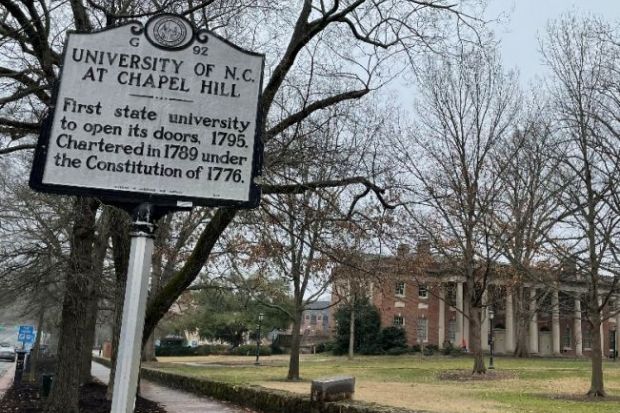University of North Carolina faculty have voted to demand their trustees reconsider their unusual intervention in rejecting a tenured position for the black New York Times journalist who created the 1619 Project.
The decision in the case of Nikole Hannah-Jones is raising concern across US higher education as a dangerous new instance of academic freedom under attack from politicians.
North Carolina faculty reflected that view in their vote, telling their trustees they must relent “to address a breach of trust in a process that is essential to our standing as a leading public research university”.
Some 300 faculty and teaching staff have signed a similar protest statement. Several student groups did the same, and organised a rally in support of Ms Hannah-Jones.
Ms Hannah-Jones, a graduate of UNC’s School of Journalism, won the 2020 Pulitzer Prize for Commentary for creating The 1619 Project, which explains the central role of slavery and black Americans in the development of the US as a nation.
The project has been embraced by US educators from elementary schools to colleges, while faulted by political conservatives who reject the centrality of the black experience and have highlighted some instances of inaccuracies.
Last month the university announced the appointment of Ms Hannah-Jones to the Knight chair in race and investigative journalism at UNC’s journalism school, where she earned a master’s degree in 2003.
While past Knight chairs have been given tenure, the board of trustees at UNC’s flagship Chapel Hill campus declined to approve it for Ms Hannah-Jones. Instead she was left with a five-year contract as a professor with an option for future review.
The trustees are elected by the state legislature, and its chair, Richard Stevens, an attorney and former state senator, acknowledged publicly that at least one member had political concerns about Ms Hannah-Jones and her work.
The case is raising concern well beyond North Carolina. Several private university presidents in Massachusetts, in a round-table discussion with reporters, took the opportunity of a question on the case of Ms Hannah-Jones to warn against trustee interference in academic matters.
Governing boards should not be getting involved in individual personnel decisions, said Robert Brown, president of Boston University. “This is a place where boards go with peril,” Professor Brown said. “If they believe the university is wrong-headed in who they’re awarding promotions to, they should change the leadership of the university.”
That position was endorsed by Biddy Martin, the president of Amherst College, who also affirmed the importance and merit of 1619 Project. Professor Martin said she learned, back in her fourth-grade history class in Virginia, the importance of that moment in US history when the colonists brought their first slaves, first women, and first use of representative government.
“I just want to make sure those trustees or board members of North Carolina realise that, for many, many, many years, 1619 has been presented to young people as the red-letter year for the colonies that became the United States,” she said. “I defy anyone, at least in Virginia or neighbouring states, to suggest that making 1619 a red-letter year is something that is historically illegitimate.”
UNC also may find itself with some competition for Ms Hannah-Jones. A few miles north at Duke University, some faculty have begun calling on their institution to make her a job offer. The School of Public Policy at Duke “should step up”, Mark Anthony Neal, a professor of African and African American studies at Duke, wrote on Twitter.
Register to continue
Why register?
- Registration is free and only takes a moment
- Once registered, you can read 3 articles a month
- Sign up for our newsletter
Subscribe
Or subscribe for unlimited access to:
- Unlimited access to news, views, insights & reviews
- Digital editions
- Digital access to THE’s university and college rankings analysis
Already registered or a current subscriber?








